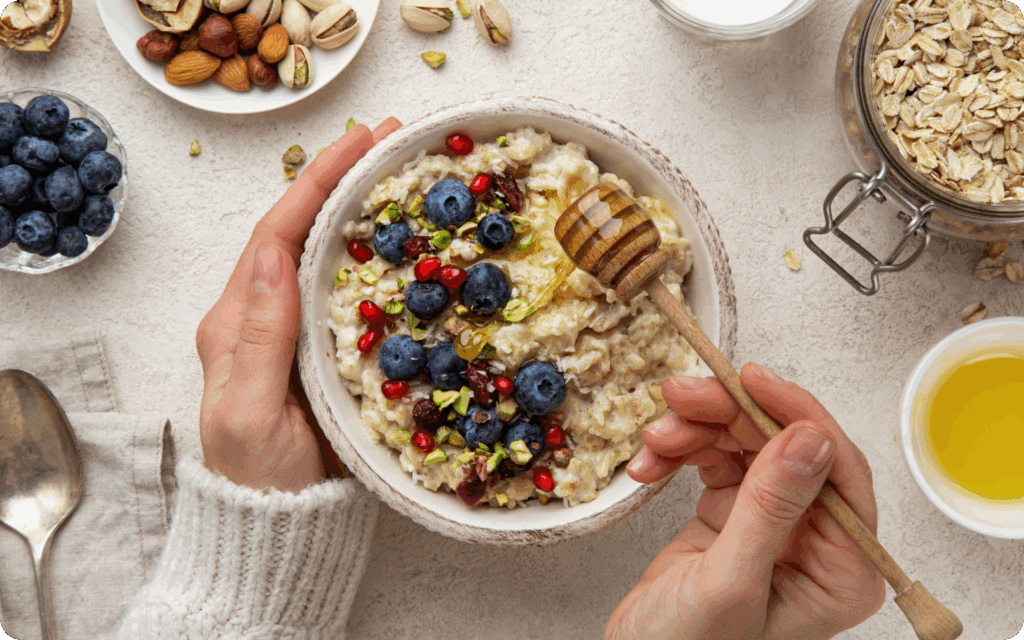For night shift workers going to bed in the morning, busy professionals with no morning appetite, or anyone who is curious about intermittent fasting, the breakfast debate feels more relevant than ever. Should you force down that morning meal, or can skipping it actually benefit your health?
This question doesn’t have a simple yes or no answer. Research has revealed a nuanced picture where individual factors – your schedule, health status, and personal goals – matter more than universal rules.
If you’re contemplating whether to join the breakfast-skippers club, you’re in the right place. Let’s find out when eating breakfast serves you best and when strategic morning fasting might align with your lifestyle.
Is It Better to Fast or Eat Breakfast?
It depends on your goals, routine, and health context. Regularly eating a balanced breakfast is associated in many studies with better appetite control, more stable glucose and lipid markers, and potentially improved cognition and circadian alignment (1, 2). However, much of this evidence is observational and may be influenced by overall diet quality, activity levels, sleep patterns, and socioeconomic factors.
Intermittent fasting – often achieved by skipping breakfast – can help some people reduce calories and improve metabolic markers (3). However, it’s not consistently superior to other methods of achieving a calorie deficit, and morning fasting may feel challenging for those sensitive to low glucose levels, under high stress, or performing demanding cognitive work.
Research has shown several potential benefits of eating breakfast (4):
- Enhanced appetite regulation throughout the day
- More stable blood glucose and lipid profiles
- Better cognitive performance, particularly memory and attention
- Improved circadian rhythm alignment
- Higher intake of essential nutrients such as fiber, vitamins, and minerals
If you wish to free yourself from all the extra pounds that have been weighing you down for way too long, start using the BetterMe: Health Coaching app and overhaul your entire life!
Conversely, intermittent fasting may offer advantages for certain individuals (5):
- Simplified meal planning and preparation
- Potential metabolic flexibility improvements
- Reduced total daily calorie intake
- Enhanced fat oxidation during fasted periods
- Better alignment with natural circadian patterns for some people
If you function well, meet your nutritional needs, and maintain metabolic health without breakfast, which is common among shift workers or those with demanding schedules, skipping it can be reasonable. However, if you struggle with energy crashes, intense cravings, or glucose fluctuations, a protein- and fiber-forward breakfast may provide crucial stability (6).
Those who can’t work up an appetite in the morning or prefer to fast should consider these alternative strategies:
- Ensure your last meal includes adequate protein and complex carbohydrates
- Stay hydrated immediately upon waking
- Plan nutrient-dense meals later in the day to compensate
- Monitor energy levels and cognitive performance
- Consider a small, protein-rich snack if morning demands are high
- Gradually adjust your eating window rather than making abrupt changes
The best choice is one you can sustain while supporting your total diet quality, sleep, activity levels, and health metrics.
For some healthy and satisfying breakfast options that can support your weight loss goals, explore these 8 healthy breakfast ideas for weight loss.
Read more: Best Foods to Eat Before Fasting: Fuel Your Body Right
Does Fasting in the Morning Burn Fat?
Fat burning doesn’t start the moment you skip breakfast. Your body typically switches from using recently consumed glucose to stored fat for energy after the 12-hour mark of fasting (7). This means that simply skipping breakfast after an 8pm dinner puts you at approximately 12-14 hours fasted by morning – approaching but not quite reaching the optimal fat-burning window. Furthermore, temporarily burning fat instead of carbohydrates will not magically result in weight loss – the key is to reduce your overall calorie intake over time.
Skipping breakfast can reduce total calorie consumption, but this depends entirely on what happens with your remaining meals. If you compensate by eating larger portions later or choosing more calorie-dense foods, the metabolic advantage disappears.
More sustainable approaches to calorie control include:
- Using an online food tracker to monitor total calorie intake and make adjustments as needed.
- Prioritizing nutrient-dense, minimally processed foods that are naturally lower in calories and higher in nutrients (8).
- Ensuring adequate protein and fiber intake to promote satiety (9).
- Reducing portion sizes of calorie-dense foods, for example, opting for half a plate of vegetables instead of a large portion of pasta alone (10).
- Including regular physical activity to burn calories and support overall health (11, 12).
- Staying consistently hydrated to support metabolic function (13).
- Practicing mindful eating to recognize hunger and fullness cues.
- Incorporating regular physical activity that you enjoy
Research hasn’t proven intermittent fasting superior to other calorie control methods that many people find more sustainable in the long term (14).
In fact, some research has suggested that regularly skipping breakfast may have negative consequences for your health and body composition (15, 16).
While these associations don’t prove causation – and individual responses vary significantly – the patterns are worth understanding.
- Weight and Adiposity
Skipping breakfast can be associated with higher BMI and a greater risk of weight gain over time. This may occur because breakfast skippers often experience stronger hunger later in the day, which can lead to overconsumption of calorie-dense foods. The metabolic disruption from irregular eating patterns may also influence how the body stores and utilizes energy (17).
- Glucose Regulation
Missing the morning meal regularly can impair glycemic control and increase insulin resistance, potentially raising Type 2 diabetes risk through PI3K pathway dysregulation (16).
In addition, when you break an extended fast with a large meal, blood glucose spikes more dramatically than with smaller, regular meals (18).
- Lipid Profile and Cardiovascular Health
Breakfast omission has been linked to adverse lipid markers and elevated cardiovascular risk (19). Irregular eating patterns may disrupt the body’s natural rhythm for processing fats and cholesterol (20). Some studies have suggested that people who skip breakfast may have higher levels of LDL cholesterol and triglycerides (21).
- Circadian Disruption
Your internal body clock, which is governed by the suprachiasmatic nucleus (SCN), relies partially on meal timing for synchronization (22). Skipping breakfast can misalign these rhythms, altering cortisol patterns and other metabolic hormones. This disruption may affect sleep quality, energy levels, and overall metabolic health (2).
- Cognitive Function
Morning fasting may reduce memory, attention, and processing speed, particularly during cognitively demanding tasks (23). Students and professionals who require sharp mental performance in the morning may be particularly affected.
- Mental Health
Some research has linked breakfast skipping to higher rates of depression and anxiety, possibly through cortisol and neurotransmitter imbalances affecting serotonin and dopamine pathways (24). The stress of hunger combined with morning demands may exacerbate mood disorders in susceptible individuals.
- Immune Function and Inflammation
Overeating ultra-processed foods as a result of skipping breakfast might increase pro-inflammatory markers, potentially elevating susceptibility to chronic inflammation and infection risk (25). The immune system relies on consistent nutrient availability to function optimally.
- Bone and Renal Health
Breakfast skippers may experience lower bone mineral density and vitamin D deficiency (26), along with increased risk of renal dysfunction (27). This could result from overall reduced nutrient intake or specific deficiencies in bone-supporting minerals typically found in breakfast foods.
- Athletic Performance
Training performance often suffers when muscle glycogen stores are low from prolonged fasting (28). Athletes who train in the morning without refueling may experience reduced power output, endurance, and recovery capacity.
- Gut Microbiome and Chronic Disease Risk
Meal timing alterations can shift gut microbiome composition, with potential downstream effects on metabolic health and cancer risk. The gut bacteria that support optimal digestion and immune function thrive on consistent feeding patterns (29).
Disclaimer:
Interpret these findings with caution. Many of these studies are observational, which means they show an association, not a direct cause-and-effect relationship.
Lifestyle confounders, such as the fact that people who skip breakfast often have less healthy diets overall, smoke more, and exercise less, can influence the results. People who skip breakfast may also engage in other behaviors or be affected by other factors that affect health outcomes, which makes it difficult to isolate the effects of meal timing alone.
The most important factor in how skipping breakfast affects your health remains your total diet quality and overall lifestyle.
Read more: Is 15 Hours A Good Fast? The Truth According To Science
How Do You Fast Properly?
Start Gradually
Begin with a 12-hour overnight fast and gradually extend to longer periods. Abrupt changes can trigger intense hunger, mood swings, and metabolic stress. Allow your body 1-2 weeks to adjust to each new fasting window before extending the duration further.
Optimize Your Pre-Fast Meal
Your last meal before fasting should emphasize protein and complex carbohydrates while minimizing added sugars. This combination helps stabilize blood glucose during the early fasting hours and reduces intense hunger signals. Include healthy fats to promote satiety (9, 30).
Stay Hydrated and Add Electrolytes
Dehydration intensifies hunger and fatigue during fasting periods. Drink water immediately upon waking and continue throughout your fast. Add a pinch of salt to support electrolyte balance, particularly during longer fasts.
Understand Hunger Signals
The impulse to eat can come from visual, emotional, or other triggers that exist outside of physiological hunger. Spend time getting to know where your hunger signals are coming from and learn to listen to your body. Satiety signals can also take time to register, so in addition to eating when you’re hungry, try to stop eating when you feel about 80% full. Give it 10 minutes or so, and you may realize that you’ve eaten enough to feel satisfied but not stuffed.
Use Exercise Strategically
Physical activity can serve as a distraction, which may help you navigate through difficult hunger periods (31). Light exercise during your fasting window may actually enhance fat oxidation and make the fast feel more manageable (32). Just avoid vigorous activity that requires a lot of energy and will probably make you hungrier.
Plan Your Breaking Meal Carefully
When ending your fast, choose nutrient-dense foods that won’t cause dramatic blood sugar spikes. Protein, fiber, and healthy fats should form the foundation of your first meal. Avoid immediately consuming large quantities of refined carbohydrates.
Monitor Your Response
Pay attention to energy levels, mood, cognitive function, and physical performance. Quality sleep, stable energy, and maintained strength indicate that your fasting approach is working well. Persistent fatigue, irritability, or performance decline may signal the need for adjustments.
Is It Better to Fast in the Morning or in the Evening?
The optimal fasting window depends on your circadian rhythm, work schedule, social commitments, and personal preferences. Intermittent fasting works by creating a consistent eating window that allows for reduced overall calorie intake (33).
Morning fasting (16:8 method, eating from noon to 8pm) may work well if you:
- Have a low natural appetite in the morning
- Prefer family dinners and social evening meals
- Want to align with natural cortisol patterns
- Have flexible morning schedules
- Exercise better in a fasted state
BetterMe is your fast-track ticket to long-lasting weight loss! Tailor your fitness journey and maximize your results with just a couple of swipes!
Evening fasting (eating from 7am to 3pm) may suit you better if you:
- Experience strong morning hunger
- Have demanding cognitive work in the morning
- Prefer larger meals earlier in the day
- Sleep better with an empty stomach
- Have more energy for morning workouts after eating
The 14:10 approach offers a moderate option: eating from 8am to 6pm provides many fasting benefits while accommodating both breakfast lovers and those who prefer earlier dinner times.
Some research has suggested that our circadian clocks are naturally programmed for earlier eating, with insulin sensitivity typically higher in the morning and declining throughout the day (34). However, consistency matters more than perfect timing – choose a schedule you can maintain long-term.
If you’re looking to explore how intermittent fasting specifically affects women’s hormonal health, you may find our comprehensive guide on the benefits of intermittent fasting for women particularly helpful.
Which Meal Is Best to Skip?
Rather than following universal rules, consider your individual energy patterns, work demands, and lifestyle factors when choosing which meal to skip.
Skip breakfast if you:
- Naturally have a low morning appetite
- Work evening or night shifts
- Prefer larger afternoon and evening meals
- Have flexible morning schedules
- Experience better focus when fasted
- Have a balanced, satiating meal at hand for when you break your fast
Skip dinner if you:
- Are feeling full after having a balanced, satiating lunch
- Experience digestive issues with late eating
- Prefer lighter evening routines
- Want to align eating with natural circadian patterns
- Find it easier to start your fast in the evening
Skip lunch if you:
- Have consistent morning and evening social or family meal obligations
- Are able to maintain consistent energy levels mid-afternoon while fasted
- Feel more focused during the day while fasted
- Prefer two larger, balanced, more satisfying meals
Consider your work and social context: If your job requires morning presentations or your family values evening meals together, structure your fasting around these commitments rather than fighting against them.
The meal you skip should be the one that causes the least disruption to your energy, performance, and relationships while still allowing you to meet your nutritional needs through your remaining meals.
How Long Is It Good to Fast for?
If safe for you, it can be good to fast for as long as you can to unlock benefits (35), although fasting for more than 24 hours is particularly taxing and should be approached cautiously.
Understanding what happens at different fasting durations helps you align your fasting length with your specific goals (36).
0-4 Hours: Your body processes the most recent meal and stores excess energy. Insulin levels remain elevated, and you’re primarily burning glucose for fuel.
4-16 Hours: You start to experience an increase in fat-burning as glucose stores deplete. Autophagy, the cellular cleanup process, may start to activate. Growth hormone levels may begin rising, which is believed to support muscle preservation during the fast.
16-24 Hours: You enter the optimal fat-burning zone as your body switches to using stored fat and ketone bodies for energy. Autophagy ramps up significantly, potentially supporting cellular repair and longevity. This window is where many people report feeling mental clarity and stable energy.
24-72 Hours: Ketone production increases substantially to fuel brain function. Fat burning and autophagy continue at accelerated rates. Brain-derived neurotrophic factor (BDNF) may increase, supporting cognitive function and neuroplasticity (37). However, this duration requires careful monitoring and may not be appropriate for everyone.
Beyond 72 Hours: All benefits may continue, but extended fasting requires medical supervision. The risks start to outweigh the benefits for most people, and nutrient deficiencies become a concern.
For most health and performance goals, 16-24-hour fasts provide substantial benefits while remaining sustainable and safe. Longer fasts may offer additional advantages but require greater preparation, monitoring, and consideration of individual health status. It’s also important to remember that some people should not fast at all, so always talk to your healthcare provider before you start.
If you’re new to intermittent fasting and want to understand the complete framework, our detailed intermittent fasting guide covers everything from beginner protocols to advanced strategies.
There is no single best time to eat for weight loss. The most important factor is creating a consistent calorie deficit (38). Some people find success with time-restricted eating (intermittent fasting), while others prefer eating smaller, more frequent meals. The optimal timing is one that helps you control your overall calorie intake and fits sustainably into your lifestyle. Yes, eggs are an excellent breakfast choice for weight loss. They are high in protein and healthy fats, which promote satiety and can help you eat fewer calories throughout the day (39). Pairing eggs with fiber-rich foods such as vegetables or whole-grain toast creates a balanced, filling meal. While the idea of kickstarting your metabolism is a bit of a myth, you can support a healthy metabolic rate by starting your day with movement (such as a brisk walk), staying hydrated, and eating a protein-rich breakfast. Protein has a higher thermic effect of food (TEF) than carbs or fats, which means your body burns more calories digesting it (40). There’s no magic time to stop eating to lose belly fat. The key is your total daily calorie intake. However, some research has suggested that avoiding large meals close to bedtime can improve sleep quality and support metabolic health, which may indirectly help with weight management for some people (41). A common recommendation is to stop eating 2-3 hours before you go to sleep, but different schedules may work for different people.Frequently Asked Questions
What is the best time to eat to lose weight?
Are eggs a good breakfast for weight loss?
How can I kickstart my metabolism in the morning?
What time should you stop eating to lose belly fat?
The Bottom Line
The breakfast versus fasting debate highlights a crucial truth about nutrition: individual context matters more than universal recommendations. Your optimal approach depends on your unique physiology, lifestyle demands, and health goals, rather than following trends or rigid rules.
Consider your current energy patterns, work demands, and how different eating schedules affect your mood, performance, and relationships. Quality sleep, consistent physical activity, and nutrient-dense food choices will influence your success more than the specific timing of your meals.
Start with small adjustments – whether that’s adding protein to your morning routine or gradually extending your overnight fast – and monitor how your body responds. The sustainable approach is the one that enhances rather than fights against your natural rhythms and commitments.
Remember that flexibility serves you better than perfection. Your optimal eating pattern may shift with life changes, seasonal demands, or evolving health needs. Stay curious about what works for your body while maintaining the foundational habits that support long-term wellness.
DISCLAIMER:
This article is intended for general informational purposes only and does not serve to address individual circumstances. It is not a substitute for professional advice or help and should not be relied on for making any kind of decision-making. Any action taken as a direct or indirect result of the information in this article is entirely at your own risk and is your sole responsibility.
BetterMe, its content staff, and its medical advisors accept no responsibility for inaccuracies, errors, misstatements, inconsistencies, or omissions and specifically disclaim any liability, loss or risk, personal, professional or otherwise, which may be incurred as a consequence, directly or indirectly, of the use and/or application of any content.
You should always seek the advice of your physician or other qualified health provider with any questions you may have regarding a medical condition or your specific situation. Never disregard professional medical advice or delay seeking it because of BetterMe content. If you suspect or think you may have a medical emergency, call your doctor.
SOURCES:
- The Effects of Breakfast and Breakfast Composition on Cognition in Adults (2016, sciencedirect.com)
- Breakfast Consumption Augments Appetite, Eating Behavior, and Exploratory Markers of Sleep Quality Compared with Skipping Breakfast in Healthy Young Adults (2018, cdn.nutrition.org)
- Intermittent Fasting: Exploring Approaches, Benefits, and Implications for Health and Weight Management (2024, npjournal.org)
- Breakfast in Human Nutrition: The International Breakfast Research Initiative (2018, pmc.ncbi.nlm.nih.gov)
- Intermittent Fasting and Metabolic Health (2022, pmc.ncbi.nlm.nih.gov)
- The Effects of Breakfast Consumption and Composition on Metabolic Wellness with a Focus on Carbohydrate Metabolism (2016, sciencedirect.com)
- Efficacy and safety of prolonged water fasting: a narrative review of human trials (2023, academic.oup.com)
- Healthy Breakfast (2020, bda.uk.com)
- Optimising foods for satiety (2015, sciencedirect.com)
- What is the role of portion control in weight management? (2014, nature.com)
- Exercise sustains the hallmarks of health (2023, sciencedirect.com)
- Benefits of Physical Activity (2024, cdc.gov)
- Hydration for health hypothesis: a narrative review of supporting evidence (2020, link.springer.com)
- Is isocaloric intermittent fasting superior to calorie restriction? A systematic review and meta-analysis of RCTs (2025, nmcd-journal.com)
- Skipping breakfast and its wide-ranging health consequences: A systematic review from multiple metabolic disruptions to socioeconomic factors (2025, sciencedirect.com)
- Skipping breakfast and its wide-ranging health consequences: A systematic review from multiple metabolic disruptions to socioeconomic factors (2025, sciencedirect.com)
- Irregular meal-pattern effects on energy expenditure, metabolism, and appetite regulation: a randomized controlled trial in healthy normal-weight women (2016, sciencedirect.com)
- 6 Tips for Fasting Safely (2024, health.clevelandclinic.org)
- Effect of skipping breakfast on cardiovascular risk factors: a grade-assessed systematic review and meta-analysis of randomized controlled trials and prospective cohort studies (2023, frontiersin.org)
- Regular meal frequency creates more appropriate insulin sensitivity and lipid profiles compared with irregular meal frequency in healthy lean women (2004, nature.com)
- Does breakfast skipping alter the serum lipids of university students? (2025, bmcnutr.biomedcentral.com)
- Circadian Synchrony: Sleep, Nutrition, and Physical Activity (2021, frontiersin.org)
- The Effects of Breakfast and Breakfast Composition on Cognition in Children and Adolescents: A Systematic Review (2016, sciencedirect.com)
- Association of skipping breakfast with depression: a systematic review and meta-analysis (2025, frontiersin.org)
- Low-Grade Inflammation and Ultra-Processed Foods Consumption: A Review (2023, pmc.ncbi.nlm.nih.gov)
- Breakfast Skipping Is Associated with Vitamin D Deficiency among Young Adults entering Initial Military Training (2022, jandonline.org)
- Meal Frequency and Skipping Breakfast Are Associated with Chronic Kidney Disease (2020, pmc.ncbi.nlm.nih.gov)
- Fundamentals of glycogen metabolism for coaches and athletes (2018, academic.oup.com)
- Chrononutrition and Gut Health: Exploring the Relationship Between Meal Timing and the Gut Microbiome (2025, pubmed.ncbi.nlm.nih.gov)
- Fasting: How to Guide (2021, pmc.ncbi.nlm.nih.gov)
- The impact of acute exercise on appetite control: Current insights and future perspectives (2023, sciencedirect.com)
- Exercise Training and Fasting: Current Insights (2020, pmc.ncbi.nlm.nih.gov)
- Intermittent Fasting Schedules and Benefits (2024, health.clevelandclinic.org)
- Chrononutrition and Energy Balance: How Meal Timing and Circadian Rhythms Shape Weight Regulation and Metabolic Health (2025, mdpi.com)
- The Effect of Fasting on Human Metabolism and Psychological Health (2022, pmc.ncbi.nlm.nih.gov)
- Fasting Physiological Effects (2024, intechopen.com)
- Fasting: Molecular Mechanisms and Clinical Applications (2014, sciencedirect.com)
- “Calories in, calories out” and macronutrient intake: the hope, hype, and science of calories (2017, journals.physiology.org)
- The Golden Egg: Nutritional Value, Bioactivities, and Emerging Benefits for Human Health (2019, pmc.ncbi.nlm.nih.gov)
- Clinical Evidence and Mechanisms of High-Protein Diet-Induced Weight Loss (2020, jomes.org)
- The Health Impact of Nighttime Eating: Old and New Perspectives (2015, pmc.ncbi.nlm.nih.gov)





















